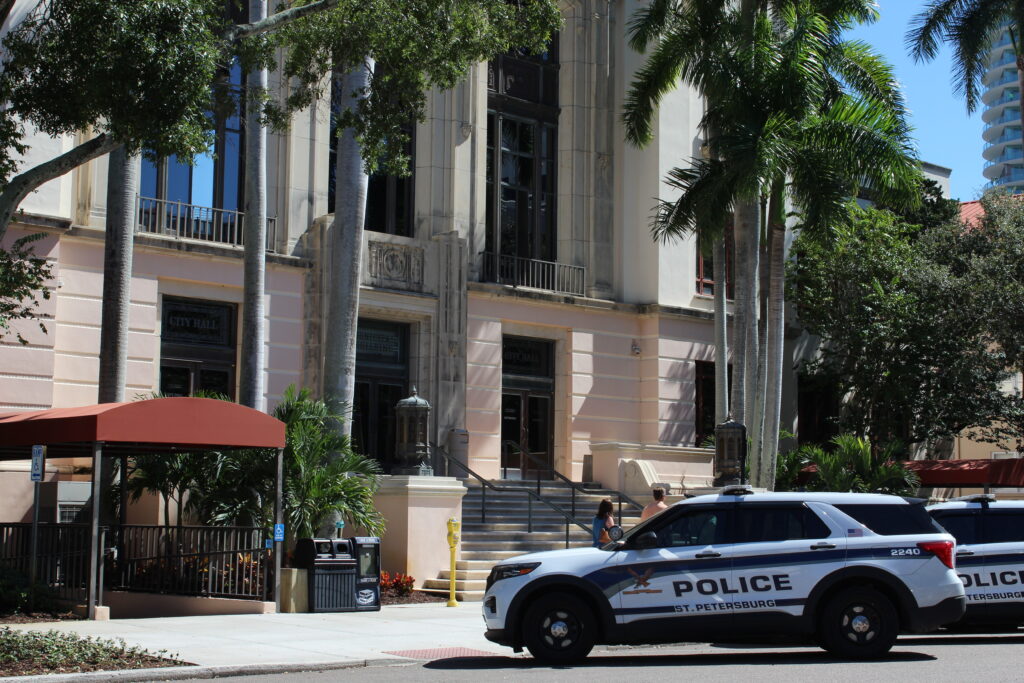
By Kelly Garcia
On Sept. 25, the St. Petersburg City Council approved a funding increase of $400,000 for Tampa Bay Psychology Associates. The $400,000 is to be added on top of the original agreement of providing $1,206,416 that was made back in October 2023. This increase in funding was made to continue to aid the psychological support that TBPA provides for St. Petersburg first responders without cost.
TBPA, whose team is led by CEO and Chief Psychologist Dr. Brandy Benson, is an independent company that provides first responders with therapy, evaluations, on-scene aid and 24/7 crisis coverage.
With first responders witnessing and experiencing traumatic situations, such as arriving at a car accident with causalities or investigating child abuse, their mental health can be at risk. Past experiences of speaking out about mental health have faced stigma and held consequences, which is why steps are being taken to provide first responders with the aid they need.
“Our first duty at the city is public safety,” Lisset Hanewicz, the vice chair of the St. Petersburg City Council said. “When we think of public safety in the city, it’s both fire and police.”
As a former prosecutor, Hanewicz was able to witness what first responders went through during their daily lives of serving the public.
“I used to see it in court or in photos,” Hanewicz said. “They have to see it live or deal with people that are in very difficult situations.”
One person who can attest to the impact that being a first responder can have on mental health is Rachel Hunter, a detective at the St. Petersburg Police Department.
Having been in the police force for around 20 years and now working in the Internet Crimes Against Children Unit, Hunter sais she has witnessed various situations.
“You can literally go from something minor like somebody has their bicycle stolen and then the very next call that you’re getting is a child who has died or an adult who has been shot or something that is very violent,” Hunter said. “Switching from one extreme to the other on the emotional spectrum is quite jarring at times.”
The impact of mental health isn’t just an internal battle, it can also bleed into the physical well-being of first responders.
“If mental health isn’t being addressed and it continues to go down,” Hunter said. “Officers become more complacent. They take more risks. Maybe they might go into a situation alone that they may not have done before, putting themselves in an increased risk that’s not necessary, just because they’re not thinking clearly.”
While resources are becoming more available for first responders, such as TBPA’s aid, that has not always been the case.
“When I joined 20 years ago, we didn’t talk about mental health,” Hunter said. “If you were struggling in something and you talked about it, you were at risk of losing your job, getting you badge and your gun taken or having that stigma.”
While Hunter believes that first responders have an increased risk of post-traumatic stress disorder or alcohol use, she also noticed that it is becoming more acceptable for police officers to talk about what they are going through.
“It’s becoming less stigmatized for the better because we do have Dr. Brandy Benson and the Tampa Bay Psychology Associates that we can go talk to, if need be,” Hunter said. “Talking about your struggles or talking to each other now is far more acceptable than it was.”
Hunter herself is an advocate for mental health in the field of first responders and works as a peer support, having finished a certification in Applied Mental Health for Law Enforcement at St. Petersburg College and created a peer support challenge coin.
As opposed to when brochures are openly grabbed by first responders that can be seen as “red flags,” the challenge coin serves as a tangible reminder for first responders that there are options out there and allows for a sense of confidentiality.
There are various ways that a first responder can attain the coin, such as at all of the TBPA offices, and the coins are beginning to widen their reach out of the state of Florida.
With the increase in funding for TBPA and local first responders, Hunter appreciates the visibility that it gives police officers and firefighters.
“The more money that goes out there, the more that we can talk about it, the more people that are going to seek help or reach out before it becomes a crisis,” Hunter said. “It will make us better officers, better firefighters, better people and we can serve our communities better.”
For Hanewicz, the vote to continue funding for St. Petersburg first responders is “an easy vote” when it’s seen that the first responders are using the funding provided by the city.
“The fact that this is not an underutilized service anymore and they need an increase shows that number one, it’s needed and it’s being used,” Hanewicz said. “And clearly the vendor who we’ve contracted with, Tampa Bay Psychology Associates, specifically Dr. Benson, has proved to be a good resource for these officers, where they’re using it to the point where we had to increase
funding.”
Benson sees this increase in funding as a telltale sign of the “exponential success” of TBPA’s program and as an opportunity to expand their reach, such as aiding the family members of first responders.
“Sometimes, it’s not our first responder struggling,” Benson said. “It’s a family member.”
The St. Petersburg department is the only department working with TBPA to include the cost of families into their funding, which Benson explained is holistically necessary in order to maintain the health of first responders.
The increase in funding also allows for growth within TBPA, such as increasing staffing and training, such as eye movement desensitization and reprocessing, a training specific for trauma processing that Benson has wanted to send more of TBPA’s staff to.
“In the past, funding has also allowed us to expand our practice,” Benson said. “We now have three office locations which provides better coverage for first responders so that they can utilize the services on their days off, based on where they live.”
Another first responder who appreciates the support for local first responders is SPPD Maj. Shannon Halstead who works for the St. Petersburg Crimes Against Persons Division.
“Anything we do proactively to address the mental and emotional challenges our officers and detectives face is a positive and necessary step,” Halstead said. “Our profession demands resilience, and ensuring our members have access to quality psychological services is vital to their well-being and effectiveness in serving our community.”
Resilience is a skill that Benson recognized is important for first responders, especially those who are seeking help.
“I really want first responders to understand that just because we’re talking about mental health doesn’t mean that we’re exclusively focusing on the weaknesses, the disorders or the symptoms,” Benson said.
Benson acknowledges that those topics have to be addressed in her work, but there is an ability to change the mindset and stigma around mental health.
“I think it’s more of if we change our mindset of what mental health is for first responders, we can really start to shift the focus to be more about maintaining resilience,” Benson said.
By maintaining mental strength and fortitude, first responders can apply “therapeutic lifestyle strategies” in their work and daily life. In turn, helping to break the stigma against mental health, which is the goal Benson and TBPA hope to continue to achieve for first responders.



